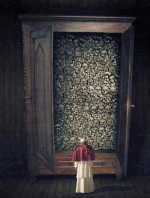 The Vatican has for the first time appeared on the State Department‘s list of money-laundering centres but the tiny city-state is not rated as a high-risk country.
The Vatican has for the first time appeared on the State Department‘s list of money-laundering centres but the tiny city-state is not rated as a high-risk country.
The 2012 International Narcotics Control Strategy Report was made public on Wednesday and Washington’s list of 190 countries classifies them in three categories: of primary concern, of concern and monitored.
The Vatican is in the second category, grouped with 67 other nations including Poland, Egypt, Ireland, Hungary and Chile.
It was added to the list because it was considered vulnerable to money-laundering and had recently established programs to prevent it, a State Department official said.
“To be considered a jurisdiction of concern merely indicates that there is a vulnerability to a financial system by money launderers. With the large volumes of international currency that goes through the Holy See, it is a system that makes it vulnerable as a potential money- laundering center,” Susan Pittman of the State Department’s Bureau of International Narcotics and Law Enforcement, told Reuters.
laundering center,” Susan Pittman of the State Department’s Bureau of International Narcotics and Law Enforcement, told Reuters.
Last year, the Vatican adapted internal laws to comply with international standards on financial crime.
The Vatican is seeking inclusion on the European Commission‘s so-called “white list” of states who comply with international standards against tax fraud and money-laundering. A decision on its inclusion is expected in June.
“Our aim is to make the ‘white list’ and we are happy that we have been put in the State Department’s less vulnerable category,” a Vatican official said, speaking on condition of anonymity.
The category of most vulnerable centres includes all members of the Group of Eight countries, including the United States, Germany, Italy and Russia, because the size of their economies and banking systems can facilitate money-laundering. It also includes small centres such as Britain’s Channel Islands.
The State Department’s methodology is different from that of the Financial Action Task Force‘s International Cooperation Review Group (ICRG), which concentrates on a nation’s compliance with international law and money-laundering regulations.
 Vatican Bank has scandalous past
Vatican Bank has scandalous past
The Vatican Bank, founded in 1942 by Pope Pius XII, has been in the spotlight since September 2010 when Italian investigators froze 23 million euros ($33 million) in funds in Italian banks after opening an investigation into possible money-laundering.
The bank said it did nothing wrong and was just transferring funds between its own accounts. The money was released in June 2011 but the investigation is continuing.
The Vatican’s new financial transparency laws set up internal regulations to make sure its bank and all other departments adhere to international regulations and standards, and cooperate with foreign authorities.
Two months ago, Italian newspapers published leaked internal letters which appeared to show a conflict among top Vatican officials about just how transparent the bank should be about dealings that took place before it enacted its new laws.
The Vatican Bank was formally known as the Institute for Works of Religion (IOR) and was entangled in the collapse 30 years ago of Banco Ambrosiano, with its lurid allegations about money-laundering, freemasons, mafiosi and the mysterious death of Ambrosiano chairman Roberto Calvi – “God’s banker”. – Reuters, 8 March 2012
 Bank of Italy suspends credit card payments in Vatican City
Bank of Italy suspends credit card payments in Vatican City
A senior Vatican official says he is “truly surprised” that the Bank of Italy ordered credit card payments suspended in the tiny city-state and insists the Vatican has taken adequate measures to fight money laundering.
The Vatican has been cash-only since January 1 after Italy’s central bank compelled Deutsche Bank Italia to stop providing electronic payment services to the Holy See. That has meant visitors to the Vatican Museums – they numbered 5 million last year – and the Vatican post office have had to pay cash for tickets and any other transactions.
It’s an inconvenience that, if left unchanged for long, could eventually affect the Vatican’s bottom line, given the critical role museum revenues play in the Vatican City State’s finances. For example, in 2011 museum revenues amounted to 91.3 million euro, helping the Vatican City State post a budget surplus of 21.8 million euro.
The Bank of Italy said in a statement this week it had no choice but to order the block because the Vatican has no banking regulatory framework or EU-recognised alternative for anti-money-laundering purposes.
The bank said it realised, during a routine search, that Deutsche Bank had never obtained authorisation to install the so-called POS (point-of-sales) machines in the Vatican and that “any other European supervisory authority would have behaved in the same way, in compliance with community law.”
 Rene Bruelhart, the new director of the Vatican’s financial watchdog agency, said in comments published Sunday that he was “truly surprised” by the decision given that the Vatican had passed a key European financial transparency test last year. “No other country in the world has adopted similar measures,” he said.
Rene Bruelhart, the new director of the Vatican’s financial watchdog agency, said in comments published Sunday that he was “truly surprised” by the decision given that the Vatican had passed a key European financial transparency test last year. “No other country in the world has adopted similar measures,” he said.
“The reality is that, considering the particular nature of the Vatican City State, adequate measures have been adopted for vigilance, prevention and fighting money laundering and financing terrorism,” he told Corriere della Sera in an interview which the Vatican press office disseminated and translated.
In truth, the Council of Europe’s Moneyval committee found some serious problems in the Vatican’s anti-money laundering efforts. The Vatican passed the test on the first try and Moneyval said it had made great progress in a short amount of time. But the Holy See received poor or failing grades for its financial watchdog agency and its bank, long the source of some of the Vatican’s more storied scandals.
Specifically, Moneyval said the role, authority and independence of Bruelhart’s Financial Intelligence Authority was unclear and that the Vatican bank’s rules for customer due diligence, wire transfers and suspicious transaction reporting were insufficient.
Bruelhart was brought in to help push through the next round of reforms and regulations to comply with Moneyval’s recommendations. He had been head of Liechtenstein’s financial intelligence unit the national agency that analyses information about suspect financial transactions and in 2010 was named head of the Egmont Group, the informal group of about 130 countries’ financial units aimed at sharing information.
 On December 14, the Vatican approved the latest tweak to its financial regulations, giving Bruelhart’s agency greater independence from the Vatican’s secretariat of state to enter into financial sharing agreements with other countries. In addition, Bruelhart said the Vatican has begun the process of entering the Egmont Group.
On December 14, the Vatican approved the latest tweak to its financial regulations, giving Bruelhart’s agency greater independence from the Vatican’s secretariat of state to enter into financial sharing agreements with other countries. In addition, Bruelhart said the Vatican has begun the process of entering the Egmont Group.
The Bank of Italy has been on something of a campaign for several years to crack down on the Vatican bank, formally known as the Institute for Religious Works, over which it has no regulatory control given the Vatican is a sovereign state. But Banka D’Italia does have regulatory control over the Italian and international banks that operate in Italy and do business with the IOR, and has used those relationships to strangle the IOR as it enforces its anti-money laundering norms.
In 2010, Italian financial police seized 23 million euro and Rome prosecutors placed the IOR’s then-president and general director under investigation for alleged violations of Italy’s anti-money laundering norms in conducting a routine transaction from an IOR account at an Italian bank. The money was eventually returned. The men technically remain under investigation but, two years on, haven’t been charged.
Then last year, under pressure from the Bank of Italy, JPMorgan closed its IOR accounts. Now, Deutsche Bank has halted its 15-year term providing electronic payment services to the Vatican.
 Bruelhart was asked why the Vatican’s efforts with Moneyval don’t seem to have appeased the Bank of Italy. “Maybe I’m not the person to whom you should ask that question,” he said. “I would ask the Bank of Italy.”
Bruelhart was asked why the Vatican’s efforts with Moneyval don’t seem to have appeased the Bank of Italy. “Maybe I’m not the person to whom you should ask that question,” he said. “I would ask the Bank of Italy.”
In its statement this week, the central bank said its recent actions targeting the Vatican were merely designed “to increase the awareness of all banks established in Italy with the regard to the need to apply the current anti-money-laundering legislation in their dealings with the IOR.”
The Vatican has said it is in contact with various service providers to restart credit card operations, and says it foresees the interruption “will be brief.”
That said, an advisory posted on the website of the Vatican Museums says that as of January 1, visitors can no longer pay for tickets via ATM or credit card. “We apologise for the inconvenience,” it reads. – The New Zealand Herald, 14 January 2013
See also
- Indian Churches must publish a White Paper on their business operations – R. L. Francis
- Vatileaks: Pope’s butler says he is “agent of the Holy Spirit” to remove evil from Vatican – Tom Kington
- Vatileaks: Is Paolo Gabriele a whistleblower or traitor? – Naomi O’Leary
- Vatileaks: Its Wojtylians versus Ratzingerians – Giacomo Galeazzi
- Vatileaks reveals a sinister power struggle in the Vatican to get an Italian pope next election – RIC
Filed under: india, italy, vatican | Tagged: benedict xvi, institute for works of religion, IOR, money laundering, vatican bank |



























Leave a comment